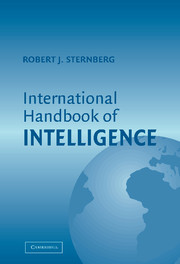Book contents
- Frontmatter
- Contents
- List of Contributors
- Preface
- 1 Intelligence Research and Assessment in the United Kingdom
- 2 Intelligence – Theory, Research, and Testing in the Nordic Countries
- 3 The Psychology of Human Intelligence in Spain
- 4 Psychology of Human Intelligence in France and French-Speaking Switzerland
- 5 Research on Intelligence in German-Speaking Countries
- 6 Is It Possible to Study Intelligence Without Using the Concept of Intelligence? An Example from Soviet/Russian Psychology
- 7 Intelligence Theory, Assessment, and Research: The Israeli Experience
- 8 Intelligence and Intelligence Testing in Turkey
- 9 Intelligence: What Is Indigenous to India and What Is Shared?
- 10 Japanese Conception of and Research on Human Intelligence
- 11 Diligence Makes People Smart: Chinese Perspectives of Intelligence
- 12 Similar Thoughts under Different Stars: Conceptions of Intelligence in Australia
- 13 Being Intelligent with Zimbabweans: A Historical and Contemporary View
- 14 Intelligence Research in Latin America
- 15 North American Approaches to Intelligence
- 16 Human Intelligence: From Local Models to Universal Theory
- Index
- References
12 - Similar Thoughts under Different Stars: Conceptions of Intelligence in Australia
Published online by Cambridge University Press: 05 June 2012
- Frontmatter
- Contents
- List of Contributors
- Preface
- 1 Intelligence Research and Assessment in the United Kingdom
- 2 Intelligence – Theory, Research, and Testing in the Nordic Countries
- 3 The Psychology of Human Intelligence in Spain
- 4 Psychology of Human Intelligence in France and French-Speaking Switzerland
- 5 Research on Intelligence in German-Speaking Countries
- 6 Is It Possible to Study Intelligence Without Using the Concept of Intelligence? An Example from Soviet/Russian Psychology
- 7 Intelligence Theory, Assessment, and Research: The Israeli Experience
- 8 Intelligence and Intelligence Testing in Turkey
- 9 Intelligence: What Is Indigenous to India and What Is Shared?
- 10 Japanese Conception of and Research on Human Intelligence
- 11 Diligence Makes People Smart: Chinese Perspectives of Intelligence
- 12 Similar Thoughts under Different Stars: Conceptions of Intelligence in Australia
- 13 Being Intelligent with Zimbabweans: A Historical and Contemporary View
- 14 Intelligence Research in Latin America
- 15 North American Approaches to Intelligence
- 16 Human Intelligence: From Local Models to Universal Theory
- Index
- References
Summary
To understand the development of psychology in Australia, one needs to be cognizant of the political and social history of this country. The most salient aspects relate to its geography and cultural links to the “old world.” It is usually assumed that Australia was discovered by Captain James Cook and first settled by the British upon the arrival of the First Fleet of eight ships in 1788. This fleet brought convicts from England, because the American War of Independence had signaled the need to seek a new penal colony for the Empire. To this day, some citizens of Australia think of themselves either as descendants of “convicts” or “squatters” (free settlers). The six colonies that were formed during the 1800s were united in 1901 despite “the tyranny of distance.” (The island-continent is approximately the size of Europe or the continental United States, and its total population today is comparable to that of California.) Independence did not diminish Australia's attachment to the “mother country England” and its king and, when World War I started, many young Australians enlisted to be sent to fight at Gallipoli in Turkey, and later on, to France. The early European inhabitants of Australia behaved in a way that was similar to those of other colonizing powers. For example, since the very beginning of settlement, the Aborigines were denied the right to ownership of land, and in fact, these native Australians were not given a democratic right to vote until a referendum that was held as recently as 1967.
- Type
- Chapter
- Information
- International Handbook of Intelligence , pp. 344 - 363Publisher: Cambridge University PressPrint publication year: 2004



